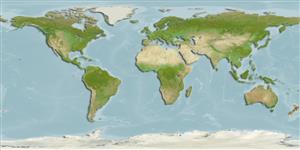分類 / Names
俗名 | 同種異名 | Catalog of Fishes(屬, 種) | ITIS | CoL | WoRMS | Cloffa
Teleostei >
Gobiiformes (Gobies) >
Thalasseleotrididae (Ocean sleepers)
Etymology: Thalasseleotris: Greek, thalassa = the sea + The name of a Nile fish, eleotris (Ref. 45335); iota: Name from the Greek word 'iota' meaning very small, referring to its size..
More on authors: Hoese & Roberts.
Environment: milieu / climate zone / depth range / distribution range
生態學
海洋 礁區魚類; 深度上下限 2 - 34 m (Ref. 57647).
Southwest Pacific: New Zealand.
大小 / 重量 / 年齡
Maturity: Lm ? range ? - ? cm
Max length : 3.3 cm SL 雄魚/尚未辨別雌雄; (Ref. 57647)
簡短描述
檢索表 | 型態特徵 | 形態測量圖
背棘 (總數) : 7 - 8; 背的軟條 (總數) : 8 - 10; 臀棘: 1; 臀鰭軟條: 7 - 9. Diagnosis: This species differs from T. adela Hoese & Larson, 1987, in having a narrower gill opening, extending forward to below posterior margin of eye or slightly behind eye (vs. under middle of eye); less extensively scaled body, with naked area reaching to below second dorsal origin or beyond (vs. near end of first dorsal fin); higher transverse scale count (usually 7 - 8 vs. 6 - 7); modally lower vertebral count (10+16 vs. 10+17); anterior nasal tube distinctly longer than posterior nasal tube (vs. subequal); two anal pterygiophores before first haemal spine (vs. 1); uppermost scale and lowermost scale on base of caudal fin with enlarged peripheral cteni (vs. no enlarged peripheral cteni). There are several color differences, including: lacking a black spot posteriorly on the first dorsal fin; usually 5 - 6 small black more or less rounded spots on the ventral midline of the caudal peduncle (vs. usually 4 horizontally elongate black spots); a broad black or dark brown area on basal third of pectoral fin (vs. no distinct black area or a small black spot dorsally on proximal upper 2 - 3 rays); dorsal, anal, and caudal fins with thin wavy grey lines (vs. uniformly pigmented); and no dark dorsomedian line on band before first dorsal fin (Ref. 57647).
Observed to be solitary and possibly, a territorial species. Inhabits broken rocky reefs with holes, crevices, and small caves; perches on rocky ledges partly overlain by silty sand or shell debris. Reported to be often collected underwater sharing caves with much larger black gobies Gobiopsis atrata. Its small size, cryptic habit, semi-transparency, and camouflage coloration make this fish very difficult to locate underwater; though readily collected with rotenone ichthyocide while scuba diving. The habitat of this species in New Zealand is very similar to that of T. adela in Australia, which is restricted to rocky reefs, often in silty turbid waters, at 1-24 m depth. May be collected using slurp gun or hand collected following controlled use of rotenone ichthyocide (Ref. 57647).
Life cycle and mating behavior
Maturities | 繁殖 | Spawnings | Egg(s) | Fecundities | 仔魚
Hoese, D.F. and C.D. Roberts, 2005. A new species of the eleotrid genus Thalasseleotris (Teleostei: Gobioidei) from New Zealand coastal waters. J. R. Soc. N. Z. 35(4):417-431. (Ref. 57647)
人類使用
工具
特別的報告
下載 XML
網路資源
Estimates based on models
Phylogenetic diversity index (Ref.
82804): PD
50 = 0.8750 [Uniqueness, from 0.5 = low to 2.0 = high].
Bayesian length-weight: a=0.00389 (0.00180 - 0.00842), b=3.12 (2.94 - 3.30), in cm total length, based on all LWR estimates for this body shape (Ref.
93245).
營養階層 (Ref.
69278): 3.1 ±0.4 se; based on size and trophs of closest relatives
Fishing Vulnerability (Ref.
59153): Low vulnerability (10 of 100).
